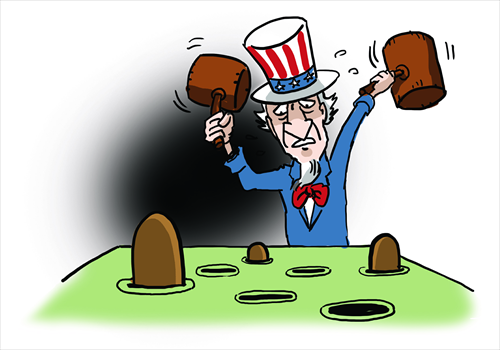Global bodies must represent new balance

Illustration: Liu Rui/GT
As long as the Ukrainian crisis continues, Russia is feeling isolated in the West-dominated institutions. The G8 , likely to soon be the G7, is a significant example as representatives of Canada, France, Germany, Italy, Japan, the UK and the US have called for Russia to be suspended and possibly expelled in the future. For its part, Russia reacts by following its own path, building additional alliances and looking for alternatives to overcome the sanctions imposed by the West.
The ongoing disagreement between the West and Russia does not only reflect their different approaches on the Ukrainian matter. It goes beyond the boundaries of Kiev as it also highlights the limits of their common membership in international organizations to break the ice in times of crises. It subsequently poses the question on whether these organizations can enhance cooperation in world politics and keep the peace.
Such a debate is interwoven into the view of several important scholars in the West who consider the active participation of non-Western countries in a network of institutions such as the WTO, the UN, the IMF, the G8, the G20 and the World Bank as critical for international security.
According to their position, rising interdependence among nations, mainly at the economic level, requires mutual cooperation to serve common goals. Within this framework, the scholars argue, states like China and Russia have no other choice but to accept the modus operandi of international organizations and respect the current global governance structure. Beijing and Moscow, they conclude, might then embrace a "win-win" philosophy in world politics.
There are worth-mentioning examples demonstrating that international cooperation has been expanded in previous years. The prevention of diseases, the protection of international shipping from piracy, the crackdown on terrorism, the combat of poverty, climate change, finance and trade constitute challenges that often unite many countries and lead them to sit on the same negotiation table. International institutions certainly provide a useful platform which facilitates collaboration on almost all fronts.
Nonetheless, although the argument of Western scholars is fair, their approach seems rather biased. Instead of concentrating on the importance of dealing with world problems via international organizations, they have a parallel ambition.
They emphasize potential changes in the behavior of non-Western countries, mainly China and Russia. In particular, as the scholars envisage, China and Russia might be so heavily influenced by their participation in the West-dominated institutions that they could follow a Westernized policy in the long term. It is not a coincidence that they regard these organizations as being able to constrain Beijing and Moscow and supervise their activities and institutions.
The main problem with these theories developing in the West is that their advocates attempt to analyze the policies of non-Western countries from their own perspective. But is the behavior of both China and Russia explicable on that basis? And should their decisions be judged on the basis of US standards and ideals? The answer is rather negative.
Models that are popular and successful in the West cannot be necessarily applied in other states. What is deemed as proper, correct and right in the West is not always interpreted in the same way in China and Russia. In the final account, both states have their own historical values they seek to preserve. They are not interested in becoming Westernized.
China and Russia express a natural caution that most international institutions function as an instrument of the US. They see almost clearly that Washington attempts to serve its own interests by forming alliances within these institutions, as it happened with the Iraq War in 2003 or the non-ratification of many treaties.
Therefore, we should focus on the way international organizations are currently operating. As long as they are not representatives of the balance of power in today's world, the need for reforms will increase.
Beijing and Moscow are looking for trust in order to invest in world institutions. Perspectives for the future are optimistic, especially for China. The gradual rise of its power and the relative decline of Washington create new standards and requirements in a multipolar world. Knowing that time works in its favor, China is patient in waiting for reforms such as the reallocation of voting shares and veto powers.
The author is a research fellow at the Hellenic Foundation for European and Foreign Policy. opinion@globaltimes.com.cn